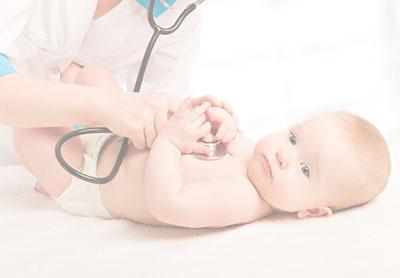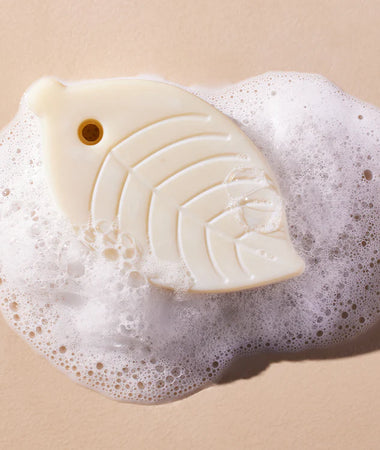
A Parent’s Guide To Identifying And Treating Your Baby's Cold
Your baby’s cold may have many symptoms or almost none at all. It can start with sneezing and a runny nose, and then suddenly transform into coughing and a fever. The symptoms of a cold often appear similar to those of other, more serious, illnesses, making it easy to panic when your baby starts to sniffle.

That’s why the experts at Mustela have put together the ultimate guide to identifying and treating baby colds. In this guide, we’ll discuss:
- Why babies are more susceptible to colds
- The common causes of a baby cold
- The symptoms of a baby cold
- Complications caused by a baby cold
- When to visit a doctor
- Treatment for your baby’s cold
- Preventing a baby cold
Let’s begin by examining why babies are more susceptible to colds than older children and adults.
Why Babies Are More Susceptible To Colds

First and foremost, babies are more susceptible to colds because they have an immature immune system. Just like the rest of a baby’s body, their tonsils, thymus, lymph nodes, bone marrow, spleen, and white blood cells are still developing and not yet fully functioning.
Your baby’s underdeveloped immune system leaves your little one vulnerable to a viral infection (the common cold). Thankfully, there are steps you can take to both prevent those infections and to help your baby feel better when they are under the weather. We’ll discuss treatment and prevention later on in this article.
Another reason babies are more susceptible to colds is that they have not yet been exposed to the various cold-causing viruses. After your baby is born, their body will come into contact with a variety of common viruses. And that’s okay. It gives your baby’s body the chance to strengthen its immune system and develop a resistance to future infections.
The Common Causes Of A Baby Cold
There are a number of ways that your baby can catch a cold. Below are the three most common forms of infection.
1) Breathing Airborne Germs
Some viruses can survive outside the human body and are spread through the air. These viruses typically don’t survive for long, but sneezing, coughing or even talking can introduce these germs into the air around your baby.
2) Touching Contaminated Surfaces
Viruses can also survive on surfaces, sometimes for two hours or longer. If your baby touches a contaminated surface or is handed something that has a virus on it, that virus can lead to a cold.
3) Coming Into Contact With Someone Who Is Ill
Direct contact is another way that a cold virus can spread. Remember that viruses can survive outside the body for some time and can settle on clothes, skin and really anything with a surface. If your little one comes into contact with a person who is ill—or even someone who has recently been ill—the virus can still spread to your little one.
Symptoms Of A Baby Cold
The first sign that your baby is coming down with a cold is usually a runny nose, which can develop into a stuffy (congested) nose. Next, your baby will most likely begin to show these classic cold symptoms:
- Fever
- Sneezing
- Coughing
Other symptoms to watch for include irritability, difficulty sleeping, trouble nursing, and decreased appetite. Your baby may exhibit one or all of these symptoms at any point while infected. It simply depends on the specific virus and what your child’s immune system needs to fight off the infection.
Usually, your baby’s body will be able to get rid of the cold virus on its own. But sometimes, the virus can develop into a bigger problem. That’s the subject of the next section.
Complications Caused By A Baby Cold
As if fever, sneezing, coughing, and general irritability weren’t bad enough, the common baby cold can sometimes develop into more serious illnesses. These secondary infections are usually easy to treat, but it’s best to prevent them from happening in the first place.
One of the most common complications caused by a baby cold is an ear infection. The virus can spread to the space behind your baby’s eardrum, infect the area, and result in a great deal of pain for your little one. Ear infections are usually fairly easy to treat with a prescription.
The virus can also move to your baby’s lungs and/or sinuses. In the lungs, an infection can trigger wheezing and difficulty breathing. In the sinuses, an infection can produce pressure, inflammation, and achiness.
Left untreated, the common baby cold can even develop into pneumonia or bronchiolitis. Chances are, your baby’s cold won’t reach this stage, but it’s always smart to take extra precautions when you can. That brings us to our next section: when to visit a doctor.
When To Visit A Doctor

Most baby colds go away by themselves in seven to 14 days. Just keep an eye out and make sure that no other symptoms develop besides the sneezing, coughing, and fever mentioned earlier. If new symptoms present themselves or if your baby’s cold lasts longer than two weeks, consult a doctor right away.
If Your Baby Is Less Than 3 Months Old
If your baby is less than three months old, call your pediatrician within the first few days of infection. For newborns of this age, the common baby cold can quickly spread to the lungs, sinuses, and ears, where it can cause more problems.
If Your Baby Is More Than 3 Months Old
Call your pediatrician right away if your baby over three months old:
- Has a temperature higher than 100℉
- Has trouble breathing
- Is constantly rubbing one or both ears (could indicate the pain of an infection)
- Is unusually irritable
- Has a persistent cough
- Has bloodshot eyes
- Develops yellow or greenish eye discharge
- Has thick, green nasal mucus for several days
- Cries in an unusual or alarming way
Regardless Of Age
If you notice the following symptoms, regardless of your baby’s age, call your doctor immediately:
- Coughing up blood or blood-filled mucus
- Difficulty breathing
- Developing a bluish tinge around the lips
- Coughing that leads to vomiting
- Refusing to nurse or eat
Treatment For Your Baby’s Cold
There is no cure for the common baby cold. The best thing you can do is treat the symptoms caused by the cold, which will hopefully make your baby more comfortable and give your little one’s immune system time to fight the infection on its own.
Avoid Over-The-Counter Medications
Over-the-counter medications should be avoided when treating a baby cold unless prescribed by a doctor. Fever-reducing medications can be used in small doses, but it’s usually better to let the fever do its job (killing the virus) as long as your baby’s temperature stays at 100℉ or lower.
Cough and cold medications, on the other hand, are not safe for infants, babies, and young children. Always consult a pediatrician before giving your baby any medications.
Keep Your Baby Hydrated
Your baby should drink the usual amount of liquid (be it breast milk, formula, or water). Having your little one drink plenty of fluids will help avoid possible dehydration. That said, avoid the temptation to try and give extra fluids.
Raise The Humidity Of The Air
A cool-water humidifier or steam vaporizer can increase the humidity of the air and relieve nasal congestion and ease breathing difficulty. You can also try adding an essential oil to the vaporizer to clear congestion and improve mood and energy.
Calm and Ease Baby’s Breathing With A Chest Rub

A topical cream can help ease your baby’s breathing discomfort. Massage the balm onto your baby’s chest, shoulders, arms, and upper back to gently soothe, calm, and relax your sick baby.
Now that you know how to treat a baby cold, let's review a number of steps you can take to prevent a cold from occurring in the first place.
Preventing A Baby Cold
There are plenty of precautionary measures you can take to protect your baby against catching a cold, including:
- Keeping your baby away from anyone who is sick
- Coughing or sneezing into a tissue or the crook of your arm (even if you’re not sick)
- Cleaning toys and smooth surfaces often
- Washing your hands before feeding or touching your baby
- Washing your baby’s hands often
As you can tell from this list, keeping germs away from your baby is the best preventative measure.
Beyond prevention, simply follow the advice in this article, call your doctor if symptoms persist, and keep your baby comfortable while their body fights off the infection.
- reg.
- $18.00
- Sale price
-
$18.00
- reg.
-
reg. $18.00
- Unit price
- /per
- reg.
- $22.00
- Sale price
-
$22.00
- reg.
-
reg.
- Unit price
- /per
Suggested Articles

The Characteristics Of Your Baby's Sleep

The Secret Of Baby Skin

Protecting Your Baby's Skin In The Winter
Get tips, news
and exclusive offers






